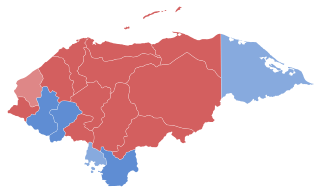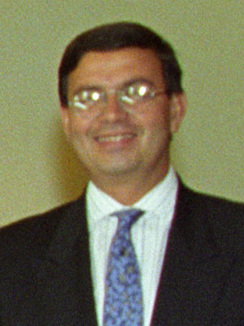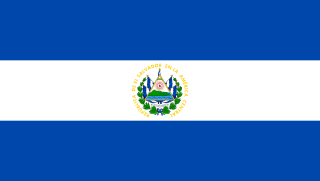 |
|---|
|
Legislative |
Judiciary |
|
Legislative elections were held in Honduras in October 1930.
 |
|---|
Legislative elections were held in Honduras in October 1930.
| Party | Seats | +/– | |
|---|---|---|---|
| National Party | 23 | –3 | |
| Liberal Party | 23 | +2 | |
| Vacant | 2 | +1 | |
| Total | 48 | 0 | |
| Source: Political Handbook of the World [1] | |||
The lempira is the currency of Honduras. It is subdivided into 100 centavos.

Eduardo Bähr is a Honduran writer, scriptwriter and actor.

General elections were held in Honduras to elect a president and parliament on 30 November 1997. They were also the first elections in which the left wing Democratic Unification Party was allowed to stand.

Honduran literature describes the literature birthed out of Honduras. The literary history of Honduras is intersects with aspects of political and socioeconomic atmosphere that has long been prevalent in Honduran history. In the Handbook of Latin American Literature, Salgado claims that the birth of Honduran literature begins with Fray Jose Trinidad Reyes, who founded the first University of Honduras. The proliferation that was seen in other Central American countries did not appear in Honduras. Furthermore, because the country was under political unrest during much of its history a great deal of the literature remains unpublished and thus, unknown.

The Political Constitution of the Republic of Honduras was approved on 11 January 1982, published on 20 January 1982, amended by the National Congress of Honduras 26 times from 1984 to 2005, and 10 interpretations by Congress were made from 1982 to 2005. It is Honduras' twelfth constitution since independence in 1838. Previous charters were adopted in 1839, 1848, 1865, 1873, 1880, 1894, 1906, 1924, 1936, 1957 and 1965.

General elections were held in Honduras on 24 November 1985. Voters went to the polls to elect a new President of the Republic and a new Congress.

General elections were held in Honduras on 26 November 1989. Voters cast a single ballot for both the presidential and Congressional election.

General elections were held in Honduras on 27 November 1993. Voters cast a single ballot for both the presidential and Congressional election.

Constituent Assembly elections were held in Honduras on 20 April 1980. In July the Assembly elected Policarpo Paz García as president.
General elections were held in Honduras on March 28, 1971. Voters went to the polls to elect a new President of the Republic and a new Congress. The two main parties, the National Party and Liberal Party, had agreed before the election to split the Congressional seats equally between them, with each party being awarded 32 of the 64 seats. Additional one seat was to be allocated to the winner of the presidential elections as the president was entitled to one seat in parliament, while both parties were to be equally represented in the Supreme Court in all state institutions including the Government. Ramón Ernesto Cruz Uclés of the National Party won the presidential election with 53% of the vote. Approximately 40% out of total of around 900,000 voters abstained from voting at the elections. Some of the major topics at the elections was the issue of commitment to continued participation in the Central American Common Market and approach to the relations with El Salvador after the Football War.

Constituent Assembly elections were held in Honduras on 12 February 1965. The Constituent Assembly subsequently elected Oswaldo López Arellano as president.

Constituent Assembly elections were held in Honduras on 22 September 1957. In November the Assembly elected Ramón Villeda Morales as president.

Constituent Assembly elections were held in Honduras on 7 October 1956. Prior to the elections, President Julio Lozano Díaz established his own party, the Party of National Unity. The elections were allegedly heavily rigged and the PUN won all 58 seats.

General elections were held in Honduras on 10 October 1954. The elections were relatively honest. and saw Ramón Villeda Morales of the Liberal Party emerge as the most popular presidential candidate with 48% of the vote. However, the constitution required Congress to confirm the president if no candidate received a majority in the popular vote. The Liberals did not have a majority in Congress, and the National Party and National Reformist Movement (MNR) agreed to block Villeda's candidacy, although they were unable to agree on a candidate of their own. The two parties boycotted the confirmation session in November – an idea proposed by US Ambassador Whitting Willauer – meaning those present did not form a quorum.

General elections were held in Honduras on 10 October 1948. The elections were boycotted by the Liberal Party as the party was restricted from campaigning. Instead, they called for the electorate to abstain from voting.

General elections were held in Honduras on 28 October 1932. Voters went to the polls to elect a new President of the Republic and a new Congress.

General elections were held in Honduras on 28 October 1928. Vicente Mejía Colindres of the Liberal Party was re-elected as president, becoming the first incumbent to be re-elected in peaceful and contested elections.

General elections were held in Honduras on 28–30 December 1924. Miguel Paz Barahona was elected president and his National Party won all but one of the seats in Congress.

General elections were held in Honduras between 27 and 29 October 1923. Tiburcio Carías Andino won the presidential election with 47.1% of the vote. However, as no candidate had received an absolute majority in the public vote, Congress would vote on the candidates. However, Congress did not meet again until 1 January the following year. In December President Rafael López Gutiérrez declared a state of siege, suspended the constitution, and announced that he would remain in office in order to keep the peace. Although Congress was dominated by the two liberal parties, they did not want Carías, but also could not agree on a common candidate.

The Salvadoran military dictatorship was the period of time in Salvadoran history where the Salvadoran Armed Forces governed the country for almost 48 years from 2 December 1931 until 15 October 1979. The authoritarian military dictatorship limited political rights throughout the country and maintained its governance through rigged and fixed elections.